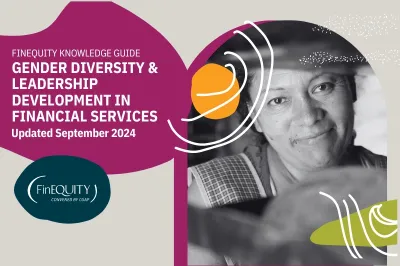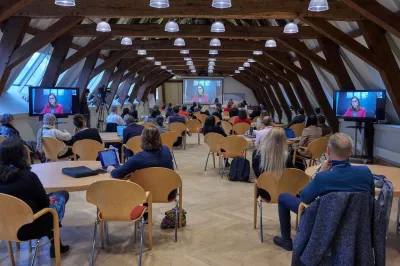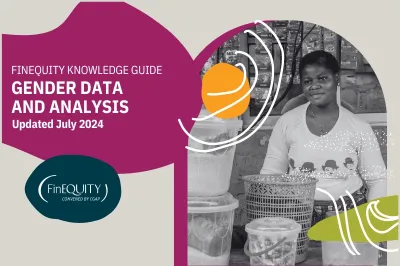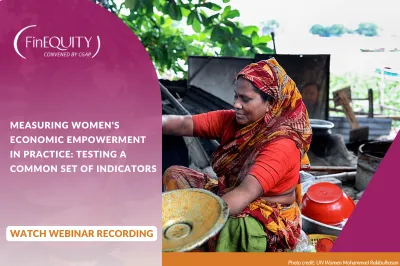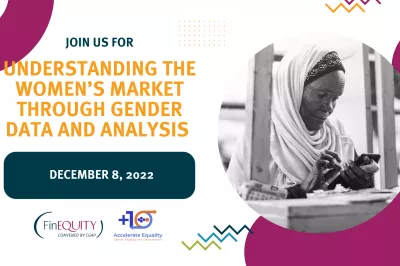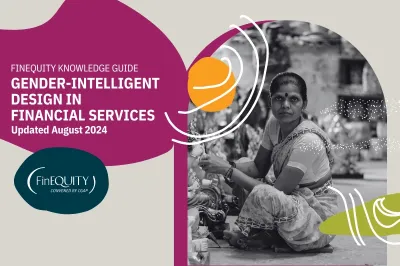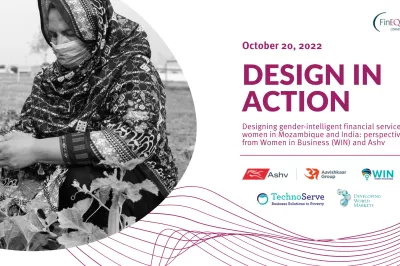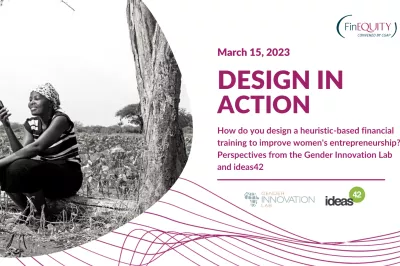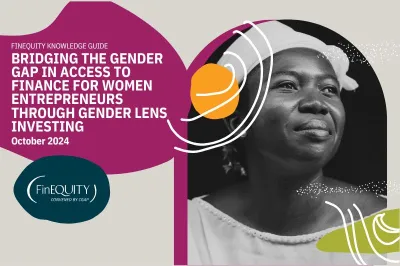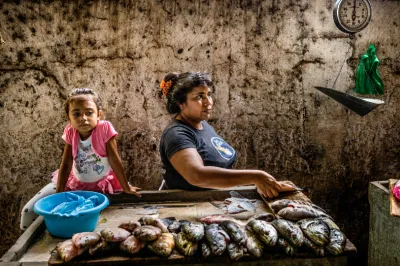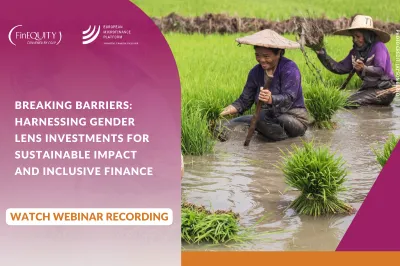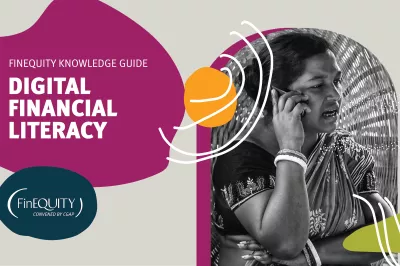FinEquity Knowledge Guides
FinEquity Knowledge Guides bring together carefully selected resources drawing on knowledge from the community of practice. The guides provide practical tools and resources to help financial services providers (FSPs), regulators, policymakers, donors, researchers, and development partners to advance women’s financial inclusion. These guides are periodically updated and are also available in Spanish.
- Gender Diversity and Leadership Development in Financial Services (Updated September 2024)
- Gender Data and Analysis (Updated July 2024)
- Incorporating Gender-Intelligent Design in Financial Services (Updated August 2024)
- Bridging the Gender Gap in Access to Finance for Women Entrepreneurs through Gender Lens Investing (October 2024)
- Digital Financial Literacy (January 2023)
In addition, this FinEquity Brief synthesizes resources from the guides to provide practical steps and tools for FSPs to enhance gender diversity and leadership across their institutions, advance the use of gender data and analysis, and adopt a gender-intelligent approach to product design and delivery.
FinEquity Knowledge Guide: Gender Diversity and Leadership Development in Financial Services
This guide brings together a selection of the most relevant practical resources, tools and proven solutions to increasing gender diversity in the financial services industry leadership and workforce. These are organized into four categories; (i) Gender Diverse Leadership, (ii) Institutional Gender Gap Assessment, (iii) Workforce Development, and (iv) Training Resources. Also featured are past workshops and related blogs on this topic.
This workshop featured one of the key tools from FinEquity's resource guide on gender diversity and leadership.
FinEquity Facilitator Aude de Montesquiou reflects on a European Microfinance Platform (e-MFP) Week discussion on why promoting gender balance and diverse leadership at all levels of financial services is key to creating gender-equitable financial systems.
FinEquity Knowledge Guide: Gender Data and Analysis
This guide provides a starting point for understanding what data is available at global, regional, national and organizational levels, and how to analyze sex-disaggregated data to measure women’s financial inclusion and better serve women customers. Also featured are past workshops and related blogs on this topic.
Seven of FinEquity's WEE Co-Lab partners tested a draft WEE measurement questionnaire, based on a background paper published last year. This webinar shared experiences from the the Co-Lab participants, the final set of indicators as well as guidance on how to incorporate the indicators into your organization's measurement of WEE.
This workshop provided an opportunity to unpack a few resources featured in the Gender Data and Analysis Guide. Financial Alliance for Women advocated for more attention on the women’s market in Global Business Case Tool for Financial Services Providers. Participants also heard from examples of how good gender data and analysis can help FSPs understand the women’s market and evaluate if they are achieving product goals related to outreach and usage.
FinEquity Knowledge Guide: Incorporating Gender-Intelligent Design in Financial Services
This guide brings together a wide scope of resources that address gender-intelligent design: research, case studies, toolkits, and best practice guidelines. It is structured to allow users to easily mine the most relevant resources on gender intelligent design in women’s financial inclusion. Also featured are past workshops and related blogs on this topic.
FinEquity’s Catherine Highet spoke with Kiran Agarwal Todi of Ashv in India and Nirza Fumo of Women in Business (WIN) in Mozambique, discussing their use of gender-intelligent design to shape financial services to better suit women’s needs. This interactive conversation focused on the design process, iteration and adaption and measuring impact, looking at the approaches that these organizations are taking.
This second webinar in the ‘Design in Action’ series focused on the work done by the World Bank's Africa Gender Innovation Lab and ideas42 to design financial heuristics for rural women in Ethiopia and to pilot mobile-phone based financial training for women.
FinEquity Knowledge Guide: Bridging the Gender Gap in Access to Finance for Women Entrepreneurs through Gender Lens Investing
This guide is designed to serve as a quick reference for investors, donors, and development partners looking to understand how to integrate a gender lens in their investment processes to support financial service providers (FSPs) serving women-led micro, small, and medium enterprises (WMSMEs). Also featured are past workshops and related blogs on this topic.
Intentionally embedding a gender lens in private investments can help grow women-led MSMEs. As part of the #FinEquity2024 Annual Meeting blog series, we share insights on how integrating a gender lens can yield both financial returns and social progress—with evidence of success from Women’s World Banking Asset Management and Deetken Impact’s Ilu Empowerment Fund.
Hosted by FinEquity and the European Microfinance Platform (e-MFP), this webinar provided a comprehensive understanding into the concept of Gender Lens Investing, exploring the expected outcomes and potential challenges for financial inclusion players engaged in this field.
FinEquity Knowledge Guide: Digital Financial Literacy
This guide aims to provide a curated list of resources for community members looking to better understand how they can incorporate Digital Financial Literacy in their programming. Also featured are past workshops and related blogs on this topic.
This publication shares an overview of Digital Financial Literacy Campaign Activity designed to increase the digital financial literacy and decision making skills of women so that they can effectively use digital financial services.
This brief helps unpack the different dimensions of digital financial literacy (DFL) and demonstrate why they should not be tackled in isolation as they are very much connected. It includes four case studies of organizations addressing DFL in their work in Cambodia, Bangladesh, and Ghana.

